by Marcus Boston Jr. | Nov 26, 2015
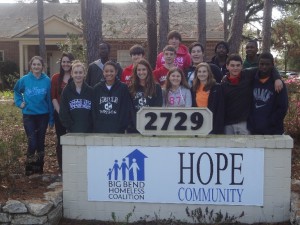
Leon County 4-Hers grow gratitude and compassion through service-learning
Developing a heart for giving back and helping others is one of the most important personal benefits youth can obtain through active involvement in a 4-H program. During this season of thanks , 4-H members all over the United States will put the third sentence of the 4-H pledge into action as they “pledge their hands to larger service” by planning and carrying out a multitude of community service activities to help families that are in need. Since its inception in the early 1900’s the 4-H program has place an emphasis on improving the community in which they live through the guidance and care of adult volunteers.
As we pause this week to celebrate the season of “Thanks” we must also remember to emphasize to our youth that the focus should not be on who can consume the most food, but instead to use the meal as a vehicle to connect with family and friends while enjoying their company. Adults and youth alike should take a pledge during the meal time that no one will post, text, or make a call during family time…but instead exercise some of the great communication skills they have learned in 4-H and get to know each other better. It’s amazing how much our families and friends don’t know about us even though we see them almost every day. Youth should also be encouraged to think of those that are less fortunate and seek out ways they can help those in need as a club, family or as an individual project. A great club or family game can be initiated that requires youth, friends and family members to write a list of all the things they are thankful for and provide fun prizes for the winners… which should be everyone that participates.
As a 4-H Youth Development Professional I am also grateful that the largest serving youth program in the world continues to make a positive impact on the lives of young people. Using the 4-H pledge as a guide I have shared just a few impacts below.
I pledge my head to clearer learning…”I’m thankful that through active participation in a variety of programs and activities youth are learning decision making skills that will help them in school and later in life as they develop into responsible adults”.
I pledge my heart to greater loyalty…” I’m grateful that continual 4-H club involvement provides youth an opportunity to build caring relationships with members of the club as well as the adult volunteer leaders.
I pledge my hands to larger service…I’m thankful that the community service projects that are carried out in each club entitles you to make someone’s life a little brighter.
I pledge my health to better living for my club, my community, my country, and my world….I’m thankful that through their participation and completion of projects youth are learning what to put in their bodies to keep them healthy as well as what not to put in them.
 Let’s continue to use 4-H as a vehicle to make our world better by taking time to invest in your future leaders of tomorrow…..our 4-H members of today. Help 4-H continue to grow by joining as a member or volunteer. Florida 4-H offers a wide variety of programs and volunteer roles to fit your skills, interests, and schedule. Contact your local UF IFAS County Extension Office, or visit http://florida4h.org.
Let’s continue to use 4-H as a vehicle to make our world better by taking time to invest in your future leaders of tomorrow…..our 4-H members of today. Help 4-H continue to grow by joining as a member or volunteer. Florida 4-H offers a wide variety of programs and volunteer roles to fit your skills, interests, and schedule. Contact your local UF IFAS County Extension Office, or visit http://florida4h.org.
by Whitney Cherry | Aug 28, 2015
 Research shows that 20-40% of children are bullied in some way. Whether bullying is verbal, physical, or done online it is a very real problem that can happen in any school, even among young school-age children. A safe and secure environment is key for the Essential Element of Belonging, one of the foundations of 4-H positive youth development. Being educated about what bullying is, knowing how to spot the signs of bullying, and learning what to do if your child is affected by this behavior can help parents address bullying if and when it happens.
Research shows that 20-40% of children are bullied in some way. Whether bullying is verbal, physical, or done online it is a very real problem that can happen in any school, even among young school-age children. A safe and secure environment is key for the Essential Element of Belonging, one of the foundations of 4-H positive youth development. Being educated about what bullying is, knowing how to spot the signs of bullying, and learning what to do if your child is affected by this behavior can help parents address bullying if and when it happens.
How to recognize bullying- Bullying can take several forms. It can be observable or secretive behavior.
| Observable Behavior: |
Secretive Behavior: |
- Intimidation and threats.
- Name calling, insults, and comments about disability, gender, and race.
- Teasing about personal characteristics or sexual harassment.
- Physical assault, tripping, hitting, pinching and other physical abuse.
- Destruction of property, demanding money or other possessions.
|
- Rejecting, excluding, and isolating victims from others.
- Spreading rumors and other public humiliation.
- Manipulating friends and relationships, passive aggression.
- Passing damaging notes or posting threatening or damaging emails or web material.
- Blackmailing, harassment, and dangerous dares.
|
Left unaddressed, bullying can cause depression and lasting psychological damage to the victim. It can result in poor attendance or psychosomatic illnesses. Violence can escalate into serious property damage, and injuries to students and adults. Bullying at school also affects others who are not involved directly but who simply witness or are aware of mistreatment of another student. These students may suffer from fear and concern about their schoolmate who is targeted. They may feel guilt but also may fear the bully so much that they do nothing to help. Worse, they may become offenders themselves because they fear the perpetrator will target them.
Bullies tend to seek out victims who:
- Are unable to defend themselves.
- Have little social support, or few friends.
- Are not involved in extra-curricular activities.
- Are low achievers in academics or sports.
- Are not popular or focused on by adults in the school.
- Have less developed social skills.
- Have difficulty communicating.
- Have low-self esteem or are unassertive.
Know the warning signs of bullying- It is not uncommon for a child who may be the victim of school bullying to be reluctant to tell his or her parents out of shame or fear. Children fear that the adults will not be able to help them or that they may make the situation worse. They may also believe the bully will retaliate against them or their friends. If you suspect that your child may be a target of school bullying, look for these signs:
- Sadness, anxiety, difficulty sleeping or eating, temper or emotional outbursts, picking on younger siblings.
- Unexplained bruises, cuts, or damaged clothing or school supplies.
- Fear of school, not wanting to go to school, or sudden drop in school performance.
- Dislike of recess and avoidance of unsupervised school areas such as the bathroom, despite the need to go.
- Withdrawal from friends and family, fear of parent communication with teachers.
- Complaints of physical problems without a medical reason.
- Any abrupt behavior change or sudden lack of self-esteem.
What Parents Can Do to Prevent and Stop Bullying –Parents are the key to preventing and stopping bullying. Here are a few ways that parents can help respond to bullying.
Stay connected with your child. The more you know about your child’s friends and their interactions with classmates and peers, the more likely you are to spot any changes in their social circle. Talk with your child every day about specifics at school and extracurricular activities such as what the best or worst part of their day was. This is also an important way to establish good communication with your child so that they can come to you when they have a problem.
Explain to your child what bullying is. Children understand that hitting or pushing another child is wrong, but you can also explain that other forms of bullying, such as excluding or ignoring someone, can also be hurtful.
Tell children what to do in case they experience or witnesses bullying. Talk with your child about the basics of what to do if they encounter hurtful behavior directed toward them or someone else. Tell your child to alert a teacher right away if they see or are subject to bullying behavior, and that it is important to stop someone from getting hurt.
Teach a child the importance of empathy. Research has shown that emotional intelligence and empathy skills may be even more important for success in life than intellectual intelligence. A child who is able to understand what it may feel like to be bullied and can understand and regulate their own emotions is less likely to engage in that kind of behavior.
Set a good example. Do you ever make fun of other people or gossip about others in front of your child? Have you ever spoken rudely to a waiter at a restaurant or to a store clerk in a shop? Even if you think your children are not listening or observing your behavior, the fact is that kids learn a lot about how to conduct themselves from watching their parents.
Talk to your school about what programs are being used to deter bullying. If you suspect that your child may be the victim of school bullying, talk to your child’s teacher about your concerns. Ask the teacher to watch out for problems and notify the school principal and counselor about your concerns as well.
As parents and volunteers, it’s our job to provide youth with a safe environment where they can learn and grow. For more resources about bullying, contact your local UF IFAS Extension Office, or download some of our other resources:
Talking About Bullying
Bullying and Children with Disabilities
Bullying Related to Lack of Time with Dad
Cyberbullying
Outcomes of Bullying
Parent’s Role in Bullying Behavior
Teens and Sexual Harassment: Making a Difference
by Monica Brinkley | Jul 10, 2015
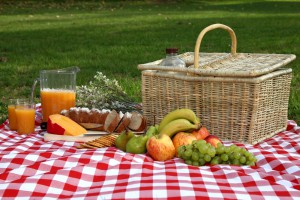
Keep your picnics safe this summer!
Summer months are a great time for picnicking with family and friends. Flies and other insects can be rather annoying, but the “bugs” you can’t see can be extremely harmful. Bacteria love the warm humid weather and grow more quickly in the summer than any other time of the year. The number of people who get sick during the hot months of the year is much greater. So read over the following tips to beat bacteria at your summer picnic.
Keep it Clean!
■ Find out if your picnic destination has a source of safe drinking water. If not, bring water or moist towelettes for cleaning hands and surfaces.
■ Always wash your hands with warm, soapy water for 20 seconds before and after handling food. Unwashed hands are a major cause of foodborne illness. Use moist towelettes if hand-washing facilities are not available.
■ Be sure raw meat and poultry are wrapped securely to prevent their juices from cross-contaminating other foods in the cooler.
■ Pack enough clean utensils for both eating and serving food. Don’t use the same utensil or platter for raw and cooked meat and poultry. Disposable plates and utensils help prevent cross-contamination.
■ Keep foods covered to prevent insects from enjoying your lunch!
Keep Cold Foods Cold!
■ Keep perishable foods cool by transporting them in an insulated cooler with plenty of ice or frozen gel packs. Perishable foods include meat, poultry, seafood, eggs, dairy products, pasta, rice, cooked vegetables, and peeled and cut fruits and vegetables.
■ Pack the cooler just before leaving home. Foods chilling in your refrigerator should be placed directly in your cooler with ice or frozen gel packs.
■ Avoid frequently opening coolers containing perishable food. It’s a good idea to store beverages and perishable foods in separate coolers.
Keep the cooler in an air-conditioned vehicle during travel and in the shade at the picnic site.
Some other resources to help or share:
UF IFAS Picnic Safety Video
UF IFAS Food Safety Factsheet for Potlucks
Fun Picnic Ideas to Try this Summer
Do you have a passion or skills that you would like to pass on to the next generation of parents, employees, civic leaders, and decision makers? 4-H needs caring adults from a wide variety of backgrounds, skills and experiences. For more information, contact your local UF IFAS Extension Office, or visit http://florida4h.org/volunteers.
Your opinion matters! Please take this short survey to help us improve our blog https://ufl.qualtrics.com/SE/?SID=SV_3gtLKjqia3F75QN
by Jenny Savely | Jun 5, 2015
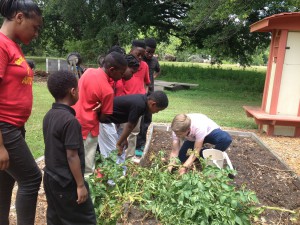
Youth learn how to grow and prepare vegetables during a gardening day camp in Escambia County.
Each summer, 4-H programs across the Florida panhandle offer a wide array of residential and day camps for youth ages 5-18. Summer residential and day camps are a great way for youth to be introduced to all that 4-H has to offer. Many camps explore specific 4-H projects, or topics, such as culinary arts, sewing, livestock or robotics, while others offer a smorgasbord of 4-H activities.
These camps differ from typical summer programs in that they are framed around the essential elements of positive youth development. 4-H is focused on developing life skills through educational programs that promote competence, confidence, connection, character, and compassion. The connection of 4-H to land grant universities like the University of Florida also means that camp curriculum is based on the best knowledge available about any given project, and taught by caring adults using learn-by-doing methods.
This summer youth are in no shortage of camps to satisfy their desire to learn while having fun. Below you can find a list of day camps that will be offered throughout the panhandle. Hurry and register your youth for the time of their life, spaces often fill quickly. Most counties also offer week long overnight camps at Camp Timpoochee or Camp Cherry Lake.
Contact the 4-H agent near you for more information and to register for any of these camps. Click on the county links below for more information. Register now and let the fun begin!
Calhoun County
July 6, 13, 20, 27 – Kids in the Kitchen, $10; Piping & Fondant Cake Decorating for Kids, $35 (or $35 for both camps)
Escambia County
June 2 – Garden to Plate Day Camp – $5, 8am-2pm (age 9-16) – Get in the kitchen with Chef David Bearl as he leads us in an interactive learning experience about cooking and activities that promote healthy lifestyles and Florida agriculture as they discuss gardening techniques and food safety.
June 17-19 – Dairy Day Camp – $5, 8am-2pm each day – Join us for three days of exploring the world of dairy. From care and biology to how to use the products of dairy cows, this camp will introduce you to the dairy industry while you make new friends and enjoy dairy related activities.
June 29 – Water Conservation Day Camp- $5, 8am-2pm – join Master Gardeners and Extension faculty in an exploration of the importance of water to our planet, how nature works to conserve it, and how we can do our part (prepare to get wet!).
July 15 – Community Awareness and Service Day Camp – $5, 8am-2pm –We will take trash items like plastic bags and jugs that you collect and reuse them to make useful items for people in need. This camp will focus on overuse and its environmental and social consequences.
July 21 – Search and Rescue Day Camp – $5, 8am – 2pm – Klaas Kids will join us for a day camp of fun and safety training. Youth will learn the process of search and rescue including how K9 units track and find lost children, and strategies youth can use for preventing crimes against them as well as what to do if they are lost in various settings.
Gadsden County
June 8 – 12 Clothing Adventures – $70, 8-5 – Youth will discover the science & technology behind fabrics, fabric care, fabric construction, and create projects.
June 15-19 Quirky Culinary Capers – $70, 8-5 – Youth will explore the magic of food science, prepare nutritious snacks, and learn how to improve their health for optimum living.
July 20-24 – It’s Alive: Junk Drawer Robotics – $70, 8-5 – Youth will engage in robotic design, use, construction, and control as they work in teams to make it come alive with everyday items. Wednesday, July 22 is challenged day in Tallahassee.
Jackson County
July 7 – Painting with a 4-H Twist Day Camp – $35, 5:00-9:00 – a local artist will walk youth step by step to the completion of a masterpiece to take home
July 20-22 – Junk Drawer Robotics – $80, 9:00 – 5:00 – learn how to make robots out of everyday household products. On the last day of camp there will be a Robotics contest with surrounding counties and will be held at the North Florida Fairground.
July 28-29 – SEW Much Fun- $45, 8:00-12:30 – designed for novice sewers with no previous experience. All materials are provided by the 4-H Department
August 6 – Cloverbud Explorations: The World of Rabbits and Poultry – $20, 8:30-11 (age 5-7) – learn how to select, properly care for, identify and enjoy a poultry or rabbit project
Jefferson County
June 22-26– Outdoor Recreation Day Camp – $35, 8:30-4:30 (age 10-15) – camp includes activities in: Forestry, Conservation, Wildlife, Archery, Air Rifles, and Sporting Clays
June 29 – July 2- Go Green in 2015 – $35, Mon. – Wed. 8-12, Thurs. 8-3 (age 5-7) – Story Time, Crafts, Fishing, Organized Recreation, Cooking, Swimming
July 8 – 12 – Go Green in 2015 – $35, Mon.-Thurs 8-4, Friday 8-12 (age 8-9) – Garden Project, Organized Recreation, Cooking, Swimming, Fishing
Leon County
June 22-26 – 4-H Wildlife camp – $80, 8-5 (age 10-18) – This outdoor nature camp will provide its participants with a basic understanding of environmental stewardship, wildlife, safety, and fun in an outdoor setting. Fun educational sessions covering National STEM (science, technology, engineering and math) initiatives will be taught by qualified instructors in aquatics, forestry, conservation, shooting sports, and orienteering.
June 30-July 2 – 4-H Outdoor cooking Camp – $80, 9-4 (age 9-13) – Youth will learn the safety and art of cooking over fire, and will go on a farm field trip.
July 13-17 – 4-H Previous Attendees Sewing Camp – $35, 8:30-12 (age 8-18) – This sewing camp is for previous 4-H sewing camp attendees or those with sewing experience. Refer to flier for required materials needed for camp.
Liberty County
June 8-11- 21st Century at W.R. Tolar School
June 15-17 – Exploring 4-H – $20, 9-4 (age 8-12) Sewing, Archery, Animals, Cooking, Bugs
June 29, July 1-3 – 21st Century at Hosford School
July 7- Rabbit Day Camp – $5, 9-4 (age 5-18)
July 20-22- Robotics Day Camp – $20, 9-4 (age 8-13)
Santa Rosa County
June 15-19 – 4-H Cooking Camp (age 8-12)- $100, 7:30-2 – Youth will learn to cook a variety of dishes and bring home a few yummy dishes! Baking, measuring, safety tips, food planning, grocery shopping, reading labels, frying, nutritional education, grilling, canning, bread-making and more will be on the agenda.
June 22-26 – Discovering 4-H Day Camp – $100, 7:30-4 – These days will expose youth all the projects Santa Rosa County 4-H has to offer. Monday: Trip to Bear Lake for wildlife and natural resources hike. Tuesday: Farm tour. Wednesday: Navarre Marine Ecology and Butterfly house. Thursday: Archery and garden tour. Friday: Nutrition, peanuts, beekeeping.
Wakulla County
June 15-17 – 4-H Sewing and Crafts Camp – $35, 8:30-4:30 – “learning sewing and artistic crafts, one stich at a time.” The camp will focus on basic sewing and crafting skills.
June 24-26 – 4-H Cooking Day Camp – $35, 8:30-4:30 – “a chef in the garden, a scientist in the kitchen.” The campers will learn how to cook simple, healthy, meals, while exploring where food comes from, and how, scientifically, it can be transformed into delicious meals through cooking.
Walton County
June 11 – Silly Science Cloverbuds (age 5-7) – $15, 8:30-12:30 – will feature fun science experiments
June 15-18 – 4-H Growing Roots – $30, 8:30-4:00 – feature a little bit of everything, like health & fitness, finances, Agriculture, beekeeping
July 13-16 – Seaside Robotics – $40, 8:30-4:00 – features not only assembly but programming
July 20-23 – X-Treme Cuisine – $30, 8:30-4:00 – will teach healthy snack and meal preparation, cooking, and basic kitchen safety
by Stefanie Prevatt | May 29, 2015
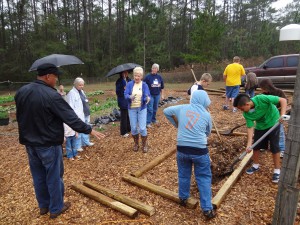
Photo credit: Zulema Wibmer, 4-H Program Assistant, Leon County 4-H Office
Garden-based education is taking America by storm. While this is concept dates as far back as the seventeenth century, it certainly feels like the popular movement of the day. 4-H has been using garden based education since 1902 with tomato and corn clubs to teach life skills such as resiliency, planning and organizing, and communication. These same skills are necessary to become a successful entrepreneur:
Resiliency: the ability to try again after failure. A garden is the perfect place for youth to test ideas or try new things. As adults, we know that sometimes the key to success is (safe) failure! If you are using a garden your classroom, allow creative experimentation. Success will build on itself and trials that missed the mark will make for more lively discussion and group cohesion.
Planning/organizing: the process of figuring out what to do (planning) and how to do it (organizing). Whether you are starting new or continuing an existing project, allowing the expression of youth ideas and goals – followed by their help implementing these plans – is crucial to your project’s success. Remember, we can grow all the vegetables in the world, but if the youth don’t learn or feel a sense of accomplishment related to the project, all we did was grow vegetables.
Communication: the exchange of thoughts, messages, or information, as by speech, signals, writing, or behavior. In today’s tech savy world, we are losing the ability to communicate in person and in writing. You have a unique opportunity to work with your group together, or as individuals, to discuss (or write descriptively) about your garden.
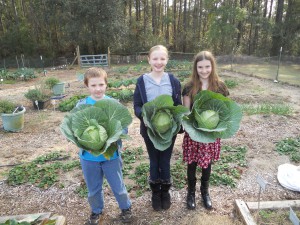
Photo credit: Zulema Wibmer, 4-H Program Assistant, Leon County 4-H Office
UF IFAS Extension offers many resources to help both youth and adults become entrepreneurs in the food industry. Food entrepreneurship has really exploded with the Cottage Food Law. Many County Extension Offices offer workshops and seminars on food entrepreneurship, and there are also some great online resources to help you get started:
If you have a green thumb, consider going “totally green” as a 4-H gardening volunteer or Master Gardener. 4-H needs caring adults like you to share their knowledge and passion for gardening with the next generation. Through the 4-H gardening project, youth not only learn gardening knowledge and skills, they also learn responsibility, teamwork, and other life skills that will help them grow up to be compassionate and competent citizens. To get involved, contact your local UF IFAS Extension Office, or visit http://florida4h.org./volunteers.
Your opinion matters! Please provide feedback on this short survey to help us improve our blog: https://ufl.qualtrics.com/SE/?SID=SV_3gtLKjqia3F75QN
 Let’s continue to use 4-H as a vehicle to make our world better by taking time to invest in your future leaders of tomorrow…..our 4-H members of today. Help 4-H continue to grow by joining as a member or volunteer. Florida 4-H offers a wide variety of programs and volunteer roles to fit your skills, interests, and schedule. Contact your local UF IFAS County Extension Office, or visit http://florida4h.org.
Let’s continue to use 4-H as a vehicle to make our world better by taking time to invest in your future leaders of tomorrow…..our 4-H members of today. Help 4-H continue to grow by joining as a member or volunteer. Florida 4-H offers a wide variety of programs and volunteer roles to fit your skills, interests, and schedule. Contact your local UF IFAS County Extension Office, or visit http://florida4h.org.







